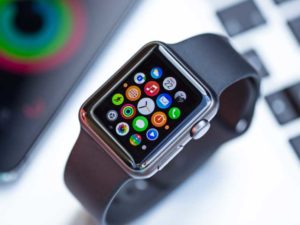Look around and you’ll see wearable health & fitness devices everywhere. Odds are good you’re actually wearing one yourself right now. Activity trackers, smartwatches, and smart clothing show up in more retail outlets by the day, it seems. The market for wearables is projected to exceed $4 billion in 2017 and expected to grow to nearly $6 billion in 2018.
Tracking devices can provide a lot of health-related feedback. However, do they really help people maintain good health or lose weight? Is the risk to your privacy worth the potential benefits?
Let’s weigh the pros and cons before you invest in a wearable device, or choose how best to use the one you already have.
Pros of Wearable Health Devices
Set Goals and Track Progress
The American Psychological Association reports that “If you are trying to achieve a goal, the more often that you monitor your progress, the greater the likelihood that you will succeed, … Your chances of success are even more likely if you report your progress publicly or physically record it.” Fitness and health trackers allow you to do all of those things.
Measure Performance in Real Time
![]() Wearable trackers and, increasingly “smart” clothing, track you while you exercise. Some measure heart rate, breathing rate, core body temperature, hydration, and more. Runners and other athletes will likely find more and better uses for these products as the market increases.
Wearable trackers and, increasingly “smart” clothing, track you while you exercise. Some measure heart rate, breathing rate, core body temperature, hydration, and more. Runners and other athletes will likely find more and better uses for these products as the market increases.
Sleep Better
I frequently advise getting quality sleep as a crucial component of good health. Wearable devices like the Pebble Time smartwatch track when you fall asleep and wake up, and even how deeply you sleep. You can also monitor the noise, light, and temperature of your environment to learn what disrupts your sleep.
Reduce Stress
Stress affects almost every aspect of your health. PIP is a device you hold between your thumb and forefinger to measure skin conductivity. It works with your smartphone or smartwatch to tell you when you’re stressed or calm. Other devices offer apps that remind you to take deep breaths at certain intervals, provide timed, guided meditation sessions, and help you record progress. The Muse headband gives you real-time biofeedback while you meditate.
Collect Data for Your Doctor
The medical field has begun using wearables like the BioPatch to collect patient data 24/7. It can notify the doctor or hospital of any emergency concerns, say, in postoperative patients. You can also refer to your FitBit or fitness watch when you see your doctor, if you need to convey updates on your general health.
Help Doctors Do Their Jobs
Patients aren’t the only ones using wearables. Here is the story of a doctor who wears Google Glass while performing surgery so that he can keep x-rays and other pertinent information in his field of vision at all times.
Cons of Wearable Health Devices
Privacy
Most users’ primary concern with wearables is privacy. TechCrunch predicted in 2015 that wearables would “spark a new privacy revolution.” The law profession is even discussing how to handle potential intellectual property disputes over who owns your personal data.
 Before buying a device, take the time to research its track record for privacy. Results may vary. For example, according to TechCrunch, “Security professionals argue that the Apple Watch is a relatively secure device, at least compared to comparable wearable devices currently on the market — but the potential vulnerabilities are still a major unknown.”
Before buying a device, take the time to research its track record for privacy. Results may vary. For example, according to TechCrunch, “Security professionals argue that the Apple Watch is a relatively secure device, at least compared to comparable wearable devices currently on the market — but the potential vulnerabilities are still a major unknown.”
Essentially, you take a risk by using wearables. You risk the device company, or your device in particular, of being hacked. But ask also, whether the company itself sees or stores your data. Researchers at American University and the Center for Digital Democracy said in 2016 that we currently lack “adequate federal laws to keep personal health information safe in wearables.”
Other Concerns
Some devices have been reported to give inaccurate readings. So maintain perspective if you suddenly get an alarming reading on your vital signs, for instance.
Battery life varies among devices, leading to frustration for some users, especially with devices you wear around the clock. Wearable devices remain somewhat expensive, a barrier for some consumers. But as they grow, prices are likely to come down and diversify.
Like them or not, wearable health devices are here to stay. As with anything that potentially affects your health, conduct thorough research and consider asking your doctor’s advice before use.
—
Photo credits: bigstock.com








